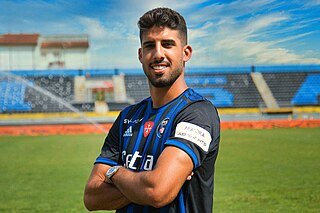Vicki Shiran was an Israeli criminologist, sociologist, poet, film director, media personality and activist. She was a leader of a movement promoting Mizrahi Jewish consciousness in Israel. She was an advocate of equal rights and played a key role in the fight for the advancement of Mizrahim. She was among the founders of The Mizrahi Democratic Coalition and the Feminist group Achoti, and is considered one of the founding mothers of the Mizrahi feminist movement.

Amnon Yitzhak, is a Haredi Israeli rabbi. He is best known for his involvement in Orthodox Judaism outreach (kiruv) among Israel's Sephardi and Mizrahi populations. He and Rabbi Reuven Elbaz are considered the leaders of the Sephardi baal teshuva movement in Israel. He is involved in activities centered on helping Jews to become more religious or observant through public speaking in Israel and around the world, and his 'Shofar' organization, which distributes his lectures in various media and on the internet.

Mati Shemoelof, is an Israeli author, poet, editor, journalist and activist. His first short story collection, "Remnants of the Cursed Book", won the 2015 award for Best Book of the Year of "Yekum Tarbut" website. "Bagdad - Haifa - Berlin" - His first Bi-Lingual collection of poems was published in Germany by Aphorisma Verlag.

Yair Qedar is an Israeli documentary filmmaker, social activist and former journalist.

Michal Aviad is director, script writer, producer and senior lecturer at the Department of Cinema and Television, Tel Aviv University.

Sami Shalom Chetrit is a Moroccan-born Hebrew poet an inter-disciplinary scholar and teacher, and Israeli social and peace activist.

Hanna Azoulay-Hasfari is an Israeli actress, screenwriter, playwright, film director and a two-time winner of the Ophir Award. She is a women's rights activist, and has dedicated her career promoting awareness regarding social justice issues and cultural diversity. In 2015, she was invited to speak at the United Nations headquarters in New York, in honor of International Women's Day, where she presented a screening of her film Orange People, in condemnation of child marriage.

Yonatan Cohen is an Israeli professional association footballer who plays as an attacking midfielder or forward for Italian Serie B club Pisa and the Israel national team.

From Language to Language is a 55-minute 2004 Belgian-French-German-Israeli Hebrew-language independent underground experimental documentary art film directed by Nurith Aviv.

The Road to Where is a 96-minute 2016 Israeli Arabic- and Hebrew-language independent underground dramatic historical art film directed by Michal Bat-Adam.

Carmen Elmakiyes Amos is a social and political activist, a medical clown, and a filmmaker. She is a founder of the "Not Nice" social movement, of the Tor Hazahav Mizrahi political movement. In April 2019, she ran in the national elections for the Knesset as a candidate for the Gesher party, led by Orly Levy-Abekasis.

Haviv Pedaya is an Israeli poet, author, cultural researcher, and professor of Jewish history at Ben-Gurion University, where she is head of the Elyachar Center for Studies in Sephardi Heritage.
Shva Salhoov is an Israeli poet, essayist, writer and art critic.

Netalie Braun is an Israeli poet, writer and filmmaker. She won the 2017 Ophir Award for the best short documentary film.

In Her Footsteps is a 2017 documentary film by Israel-Arab director Rana Abu Fraihah, her first full-length work. The film was produced by Ibtisam Mara'ana.
International Women's Film Festival In Rehovot is a film festival that occurred from 2004 to 2014 in the city of Rehovot, Israel. The purpose of the festival was to promote films made by women.

Kochavi Shemesh was a lawyer, leftist activist, and one of the leaders of the Israeli Black Panthers and the editor of its main publication Ha'panter Ha'shachor. He also helped form the Israeli political party Hadash, which formed as a merger between the Black Panthers, the Israeli Communist Party, and other leftist organizations.
Osnat Trabelsi is an Israeli film producer. She is known for producing documentary films on political topics, especially those involving Palestine, the Mizrahi experience in Israel, women's issues, colonialism, racism, and more; and for melding her business with activism, promoting filmmaking in the geographical and social periphery of Israel, and creating access to Palestinian cinema.
Rachel Leah Jones is an American-Israeli documentary film director and producer. Her documentary film Advocate about the controversial human rights lawyer Leah Tsemel, which she co-directed and co-produced with cinematographer Philippe Bellaïche, premiered at 2019 Sundance Film Festival, and won top prizes at Kraków Film Festival, Thessaloniki Documentary Festival and Docaviv Festival.

Moshe Alafi is an Israeli producer, director, and creator.















